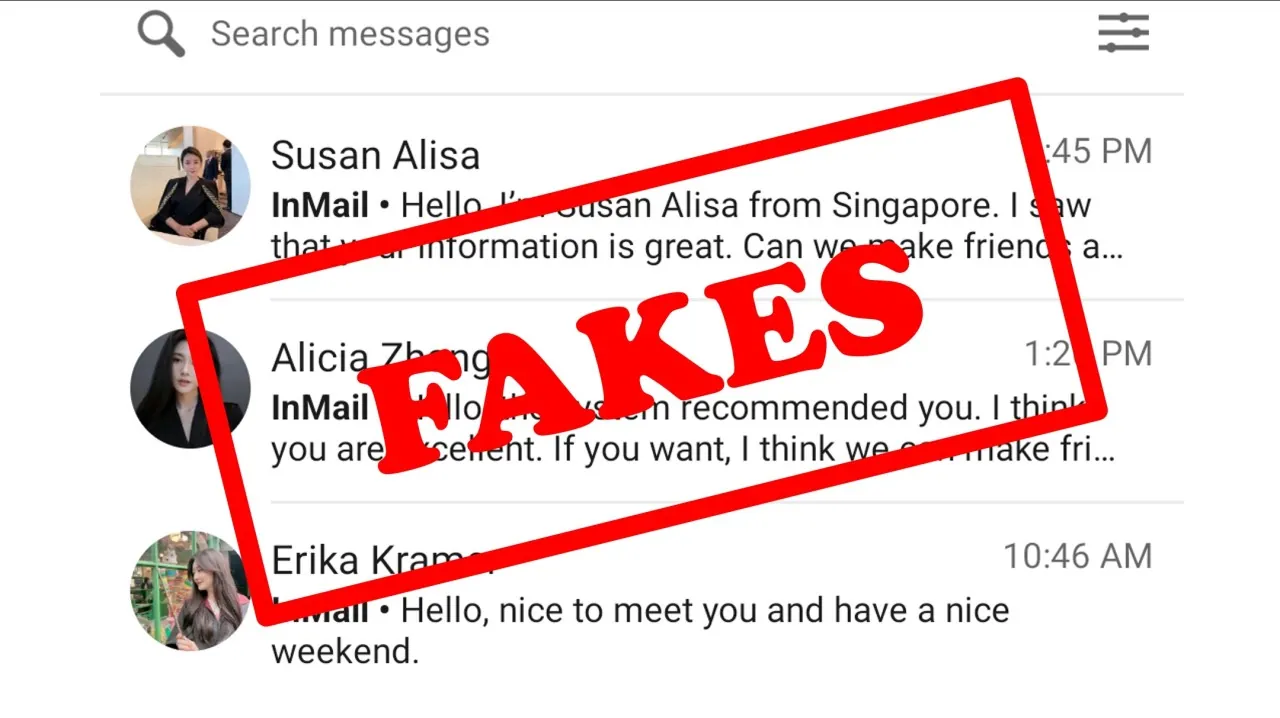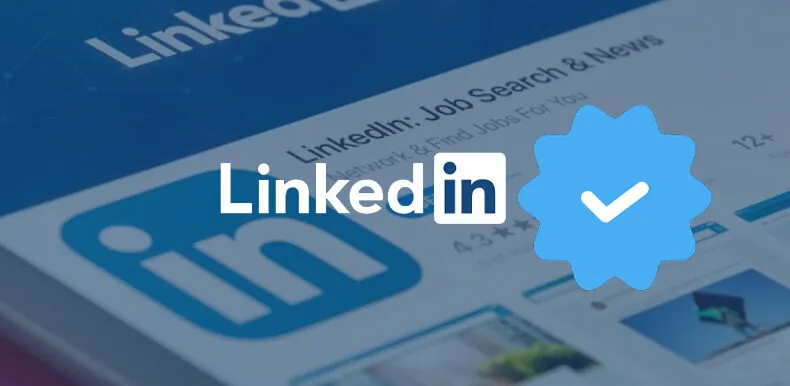In an era of reels, carousels, and trending dance routines – LinkedIn continues to defy the odds and still makes the list of the top ten most popular social media platforms in the world.
With over a billion users worldwide and 424 million active monthly users, the platform has transformed from a simple job search engine to the largest online professional network – where industry experts share content, build their brands, and engage in serious business.
So, it seems that it was only a matter of time when LinkedIn would grasp the undeniable need for a verification feature. Because where transactional relationships are concerned, trust is of course, an absolute necessity.
The platform partnered with ‘Persona’ in 2023 to offer identity verification to users across 40 countries. This feature is free for now; but we expect things to change in the long-term as more users sign up for that highly-validating, and highly-satisfying tick/ check mark alongside their profile names.
Of course, we were quick to lead by example at I-PRAC HQ – as our senior team members are now officially verified on LinkedIn. However, the roll-out of this feature begs a much deeper question than whether you too, are a verified user on this platform.
The question that we’re actually keen to delve into, is that if the world’s leading brands are championing verification (in the interest of trust and authenticity), then why is the short-term rental industry still dragging their legs to follow suit?

LinkedIn and Persona: The rising need for this verification partnership
Officially launched in 2023, LinkedIn’s free verification feature gives users the opportunity to verify their identity using Persona – the platform’s official partner.
Persona is a verification company which uses government-issued ID to ‘approve’ users; and does so in a relatively simple way. When a LinkedIn user clicks on the ‘Get Verified’ tab next to their name on their profile, Persona asks them to scan their ID, take a selfie, and agree to send Persona their data.
The verification process currently works on the LinkedIn App only (not on the web browser) and for users across the 40 stated countries. You too, can expect to be verified on the platform in a matter of minutes, providing that your LinkedIn user name is exactly as it appears on your ID, and your real-time selfie matches up.
While the verification process isn’t wildly meticulous, unlike I-PRAC’s process which touches 27 points of verification from the data collected – it certainly is a promising start from LinkedIn. And it comes with good reason according to Oscar Rodriguez, Vice President of Product Management and Head of Trust and Privacy at LinkedIn.
Back in 2022, Rodriguez wrote:
“We’ve seen a rise in fraudulent activity happening across the Internet, including here on LinkedIn, and heard questions on how we are working to prevent it. Through the use of expert teams coupled with artificial intelligence, LinkedIn detects (and removes) 96% of fake accounts and 99.1% of spam and scams”.
In the April of that same year, Rodriguez announced the need for verification on LinkedIn, which would “allow users to feel confident that the people they talk to on the platform are authentic”. The company has since, been developing ideas for a feature as such.
The LinkedIn Pressroom states that since launching the verification feature with Persona, 18 million people have signed up (October, 2023). Rodriquez has added to this and stated that by the end of 2025, the platform’s goal is to have 100 million verified users – in the pursuit of building a more trustworthy community.
It might seem easy to presume that you’re safe on LinkedIn as long as you have your wits about you, but the story is very different when you fall victim to a scam. Sadly, this has become all-too-common on the platform, as fraudsters savagely recognise it as a breeding ground for money-minded and ambitious professionals.
 In 2023, shocking research from NordLayer (a network security solution for businesses) revealed that over half the users in the US alone (52%) experienced at least one LinkedIn scam in the year. This largely came in the form of suspicious links sent via private message, fake job offers, and fake revenue-generating schemes.
In 2023, shocking research from NordLayer (a network security solution for businesses) revealed that over half the users in the US alone (52%) experienced at least one LinkedIn scam in the year. This largely came in the form of suspicious links sent via private message, fake job offers, and fake revenue-generating schemes.
Naturally, this dilutes LinkedIn’s trustworthiness and severely damages the user experience. This frightening article from CNBC goes on to disclose how “fortunes” were lost by LinkedIn professionals in 2023, who fell victim to a huge cryptocurrency investment scam.
In this scam, innocent users were groomed over a series of private messages (and small monetary wins through quick schemes), until the user trusted the scammer enough to move business onto a fraudulent website controlled by the perpetrator – through which all their funds were drained.
The common thread between LinkedIn users and short-term rental guests here (where fraudulent activity is concerned), is that both these demographics fall victim to horrifying scams, as a result of engaging with unverified service providers. Remember, the year-in, year-out statistics for holiday rental fraud in the UK from Action Fraud is continuing to stay in the millions – this would not be the case if verification by a trusted organisation was compulsory (and the entire industry would prosper from there-on).
So, with this in mind, we must commend LinkedIn for launching their verification feature – and that too, with such bold and ambitious goals. Not only have they recognised the need for trust above anything else, they are actively doing something about it.
80% of consumers prefer brands with genuine ID measures (across the board)
There’s a reason why the world’s biggest brands are introducing and continuing to develop verification features in their business models. The data clearly states that it’s valuable – and a recent study from Opinium confirms it.
The study conducted by the research firm interviewed 8000 adult consumers in the US, UK, Singapore, and Mexico – and most consumers in Mexico (92%), Singapore (89%), the US (74%), and the UK (66%), said they were more likely to complete transactions with companies that had robust verification procedures.
In fact, numerous behavioural psychologists say that just the image of a tick/ check mark is more likely to help brains release the serotonin and oxytocin hormone – making consumers feel safe and more willing to trust when they see it. So, if for example, you become verified on LinkedIn and as a result have a tick/ check mark placed next to your name – you’re inviting new connections to feel more at peace when engaging with you (and thus, more likely to do business with you).
This is also the reason why the I-PRAC logo and the official I-PRAC Approved certificate has a tick/check mark clearly incorporated into the design. When I-PRAC Approved members present this on their website and marketing collateral to prove their verification, the visuals of it alone immediately puts guests in a far more trusting place.
Could verified differentiation be the new trend?
Respectfully, verification is something that ought to have been championed for several years by now – as I-PRAC’s CEO Chris Maughan candidly continues to explain.
However, as we take note of the date presented to us, as well as the startling rise in fraudulent activity – because the internet is increasingly becoming a more untrustworthy place, we can predict that robust verification will soon become a necessary differentiator for brands across the board.
Whether you view this from the perspective of a LinkedIn user, or a short-term rental host, without verification (from a legitimate and globally recognised verification company) you may “get by” – but you will also be fighting a losing battle with competitors, who can guarantee 100% trust and peace of mind to consumers. If nothing else then as a short-term rental operator, imagine how many bookings you’re letting go by, simply because you haven’t completed a verification process that will cost you less than the cost of a take-out coffee per day.
As always, we like to stay one step ahead of the game in the industry and replicate the proven success methods of the most well-known brands in the world. If the likes of Facebook, Instagram, X, Amazon and now, LinkedIn are ambassadors of verification in the interest of building trust – then we can rest assured that the I-PRAC community is on a steadfast path of growth and long-term prosperity.
You can start your application to become I-PRAC Approved whether you own one short-term rental property or manage an entire agency. Visit I-PRAC’s website to get started or email MD Neely Khan at [email protected] with any questions.
The I-PRAC community is continuing to grow and our members’ are actively benefiting from the additional guidance, resources, and support, as part of being officially verified.



